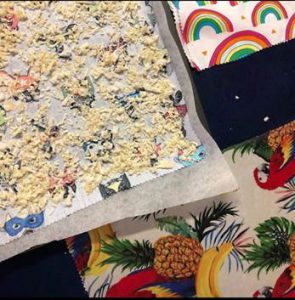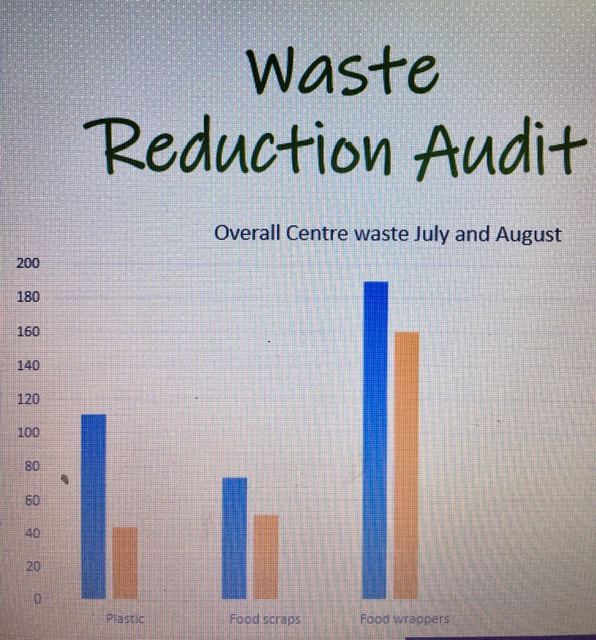What do plastic lids, bees wax and Qantas have in common?
They were all involved in exciting waste reduction initiatives driven by young children and their educators.
Since showing respect for the environment became embedded in Outcome 2 of the Early Years Learning Framework (Children are connected with and contribute to their world), services and educators aspiring to a high quality rating have been incorporating environmental activities and education into their curricula and programs. However, many feel unsure about how to do it well.
This Recycling Week we showcase the first of a number of services who have embraced environmental protection with projects that have engaged children, their families and the broader community. What’s striking in all of these projects is how the children have taken the initiative to drive positive environmental change in their homes and communities. Pop by next week for more examples, including a group of children who inspired Qantas CEO Alan Joyce to implement a coffee cup waste reduction plan at Qantas head office.
Doing more than ‘our bit’ – homemade beeswax wraps replace lunch box plastics
Every service and educator aspiring to a high quality rating strives to incorporate environmental activities and education into their curricula and programs. We know that ‘showing respect for the environment’ is embedded in Outcome 2 of the Early Years Learning Framework (Children are connected with and contribute to their world) and in Quality Area 3.2.3 of the 2018 National Quality Standard which states, ‘The service cares for the environment and supports children to become environmentally responsible’. However, many educators still feel unsure about how to do this well.
“At Balls Paddock Childrens Centre we engaged in the commonly recognised aspects of sustainable education in early childhood services such as composting and recycling bins, and we were proud of our established extensive edible gardens,” says Clare Kelly, Director at Balls Paddock Children’s Centre in the Illawarra, “We thought we were doing our bit for the environment, but it wasn’t until two of us took part in an intensive Eco Smart workshop in 2018 that we realised how much more we could do to make a difference.”
Now the centre is recognised as a leading Eco Smart service by the NSW Early Childhood Environmental Education Network (ECEEN) which publishes Eco Smart A sustainable standard for early education. The guide supports services to integrate sustainability principles into their Quality Improvement Plans and all areas of the NQS.
At Balls Paddock the educators now engage themselves, the children and their families in deeper critical reflection about their every day sustainable practices to make more meaningful change. The long term sustainable focus is waste reduction. Educators now continually reflect on meaningful ways to involve the children – it’s become common practice for the children to measure and question how much waste the service and the children use daily. This includes items such as paper towel to dry their hands, art supplies and waste from their own lunch boxes. In fact waste-free lunch boxes have now become common practice, as an example of change from adopting these reflective practices.
“The visible changes were made almost overnight,” says Clare. “We gave the children more autonomy and responsibility, and they responded by creating graphs to count how much waste we generate. On their own accord they went home and asked their parents to use re-usable containers, stop using snap lock plastic bags and glad wrap.”
 Beeswax wraps being made by Balls Paddock parents
Beeswax wraps being made by Balls Paddock parents
Staff decided that they wanted to contribute more and some attended a beeswax wraps session run by the local council – a re-usable replacement for cling wrap to store food in the fridge. They sourced a local beekeeper to supply the wax and then ran their own workshop to make wax wraps with over 20 parents attending. They now provide each new family with a wax wrap upon enrolment and make re-usable cloth lunch bags that can be washed – another easy alternative to using single use plastic.
“We’ve really cut down our use of paper,” continues Clare. “We mostly use offcuts donated from the local paper printery and and found creative ways to reduce the amount of paper used for craft. The children often use both sides of the paper, use layering techniques and have become very mindful of wasting paper.
“We collect soft plastics for recycling and our service has a collection point for the Return and Earn bin – we invite families to drop in their plastic bottles. The children are proud that they raised $100 in six months, which we will donate to our local Need a Feed Charity. We also collect for the Lids for Kids – they turn non-recyclable lids of otherwise recyclable bottles into prosthetic limbs for children.”
The children are currently investigating and researching Ecobricks, which is a plastic bottle packed with used plastic to create a reusable building block. The children are aiming to build a cubby house in 2020 or longer if less plastic is used.
“We are excited to see where our children and sustainable journey takes us next,” says Clare.

We hope that some of these examples have inspired you for this recycling week. Stay tuned next week for more fantastic examples, which include a group of children who motivated Qantas CEO Alan Joyce to get involved in a project to reduce coffee cup waste.
Head to the National Recycling Week website for more helpful information, and to have your recycling myths busted.
About CELA
Community Early Learning Australia is a not for profit organisation with a focus on amplifying the value of early learning for every child across Australia - representing our members and uniting our sector as a force for quality education and care.